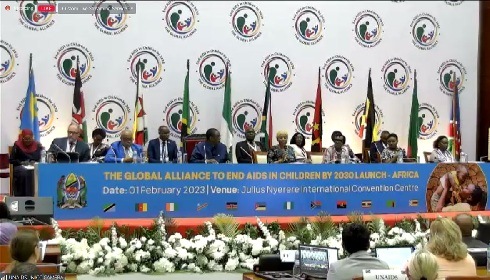
African leaders pledge to end HIV in children by 2030
Leaders and representatives from 12 African nations have committed to ending HIV infections among children by 2030 and presented their plans for achieving them during a meeting in the Tanzanian capital Dar-Es-Salam recently.
Expressing their concerns that merely 52% of children in Africa living with HIV infections are receiving life-saving treatment, far behind adults, of whom three-quarters (76%) are receiving antiretrovirals, the delegates at the meeting endorsed the Dar-es-Salaam Declaration that calls for ending the disease by 2030, proposed by UNAIDS last year, through an array of measures including testing, prevention and treatment.
Delegates emphasised the importance of a grounds-up approach with local, national and regional stakeholders taking ownership of the initiative and engaging a broad set of partners.
- Increase in global health financing may not be enough to prevent a future pandemic: Report |
| - Ending gender-based violence must for curtailing new HIV infections: Researchers Calling for ending gender-based violence, the researchers of a new study led by Montreal-based McGill University found that women who experience intimate partner violence (IPV) are three times more likely to contract HIV. |
| - UNAIDS warns of millions of AIDS-related deaths The United Nations Program on HIV/AIDS (UNAIDS) has warned that if leaders fail to tackle inequalities the world could face 7.7 million AIDS-related deaths over the next 10 years. |
Speaking on occasion, the Tanzanian Vice President Philip Mpango said, “Tanzania has shown its political engagement, now we need to commit to moving forward as a collective whole.”
“All of us in our capacities must have a role to play to end AIDS in children. The Global Alliance is the right direction, and we must not remain complacent. 2030 is at our doorstep,” he added.
Stressing that there is no higher priority than eliminating HIV infections in children, the First Lady of Namibia, Monica Geingos, said, “This gathering of leaders is uniting in a solemn vow, and a clear plan of action, to end AIDS in children once and for all.”
Welcoming the move, UNICEF Associate Director Anurita Bains said, “Every child has the right to a healthy and hopeful future, but for more than half of children living with HIV, that future is threatened.”
“We cannot let children continue to be left behind in the global response to HIV and AIDS,” she added.
Assuring the countries of its support, the UNICEF official said, “Governments and partners can count on UNICEF to be there every step of the way. This includes work to integrate HIV services into primary health care and strengthen the capacity of local health systems.”
Stating that the meeting has given everyone hope, UNAIDS Executive Director Winnie Byanyima said, “An inequality that breaks my heart is that against children living with HIV, and leaders today have set out their commitment to the determined action needed to put it right.”
“As the leaders noted, with the science that we have today, no baby needs to be born with HIV or get infected during breastfeeding, and no child living with HIV needs to be without treatment,” she added.
Pointing out that despite making considerable gains in preventing infections among children and increasing access to treatment, the progress has stalled, the WHO Director General, Dr Tedros Adhanom Ghebreyesus, said, “The Global Alliance to End AIDS in Children is a much-needed initiative to reinvigorate progress.”
He assured the nations of WHO’s support the countries with the technical leadership and policy implementation to facilitate ending AIDS in children by 2030.
Twelve countries, namely, Angola, Cameroon, Ivory Coast, the Democratic Republic of the Congo, Kenya, Mozambique, Nigeria, South Africa, the United Republic of Tanzania, Uganda, Zambia, and Zimbabwe with high HIV burdens have joined the alliance in the first phase.